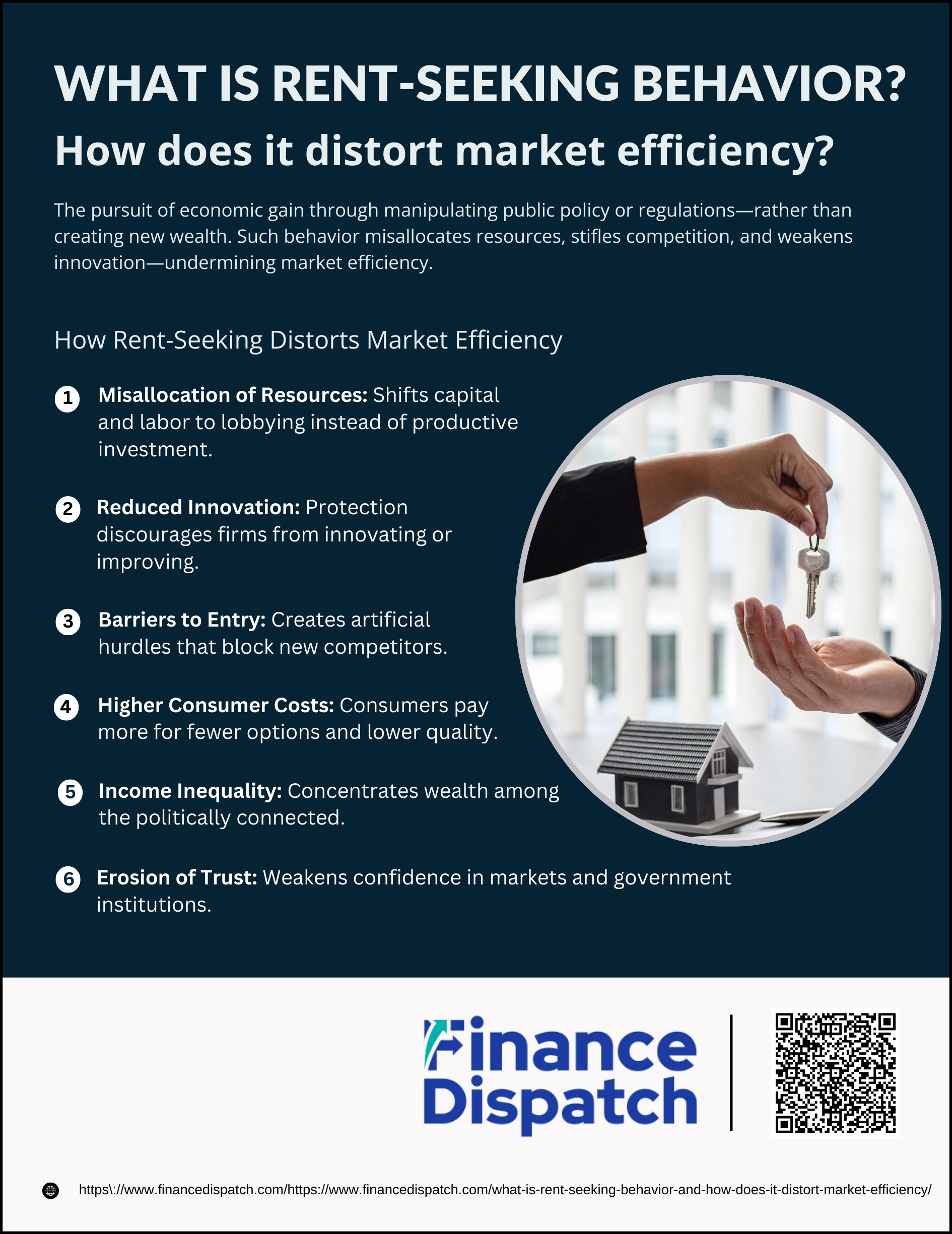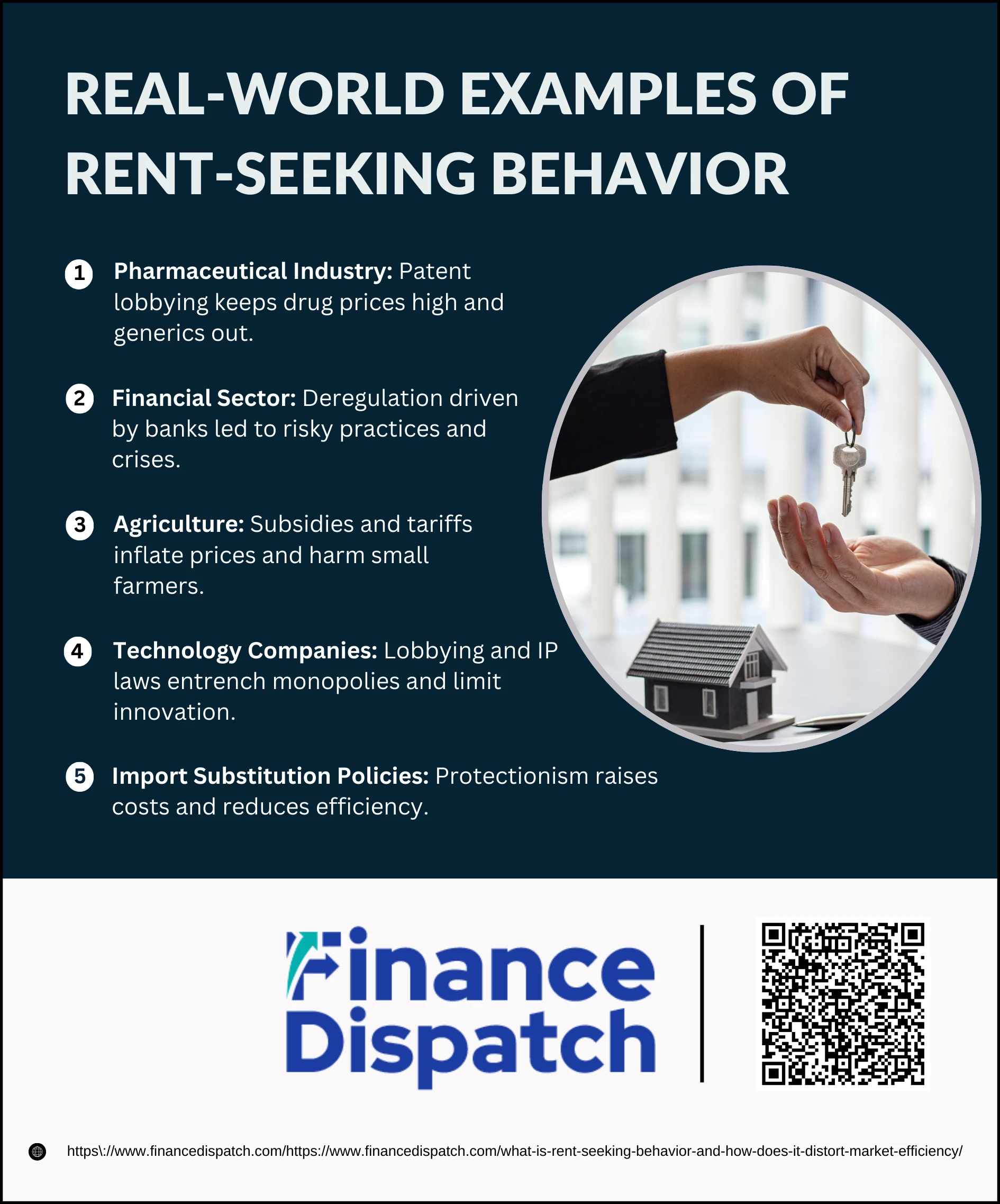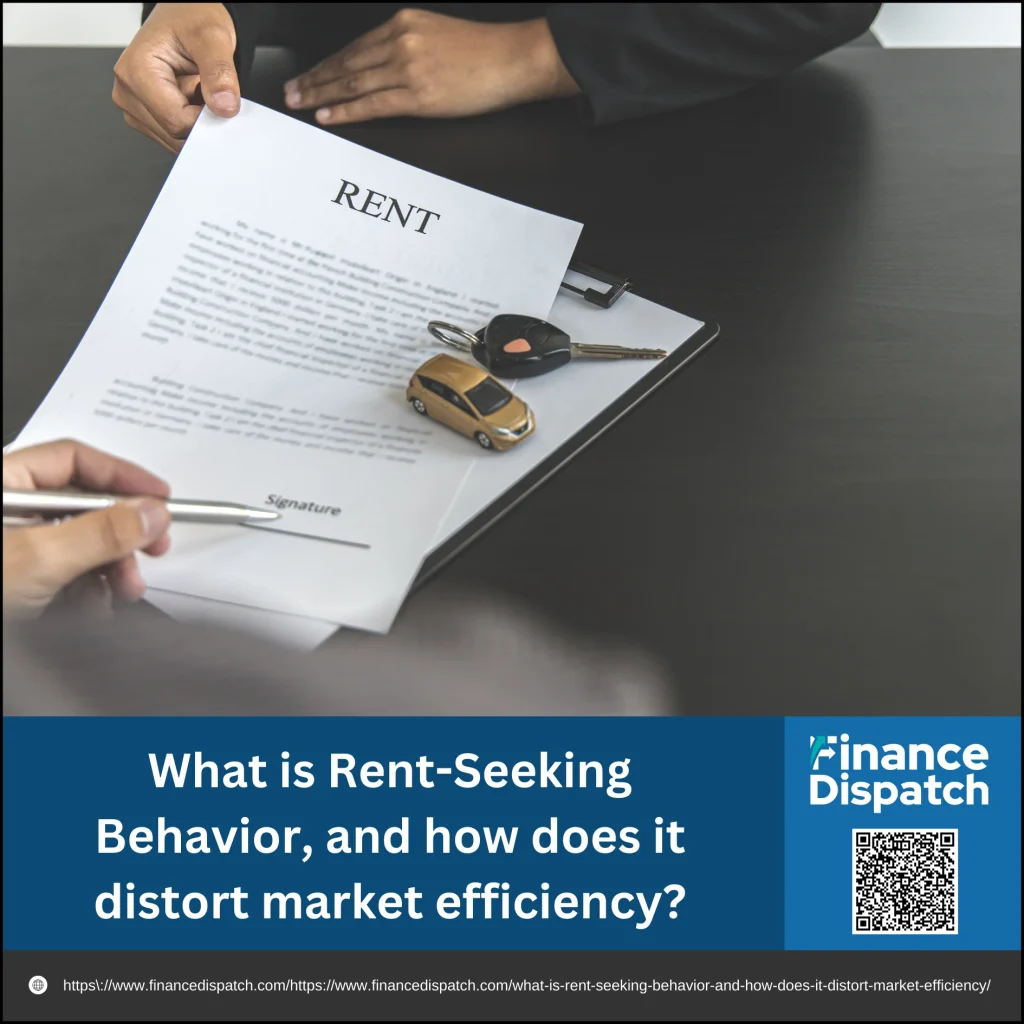Rent-seeking behavior is one of those economic concepts that quietly shapes the way markets function, often with damaging consequences. At its core, it refers to the pursuit of financial gain through political influence, lobbying, or manipulation of policies, rather than through innovation, production, or the creation of new wealth. Unlike profit-seeking, which drives efficiency and benefits society by expanding the economic pie, rent-seeking focuses on capturing a larger slice of the pie that already exists. This behavior doesn’t just redistribute resources—it also distorts competition, reduces incentives to innovate, and undermines overall market efficiency. Understanding how rent-seeking operates is crucial because it reveals why certain industries thrive not by being more productive, but by being more politically connected.
What is Rent-Seeking Behavior?
Rent-seeking behavior is the act of gaining wealth or economic advantage without contributing to productive activity. Instead of creating new value through innovation, efficiency, or better services, individuals or firms pursue profits by influencing policies, regulations, or institutions in their favor. This might involve lobbying for subsidies, pushing for trade barriers, or seeking exclusive rights that limit competition. Unlike profit-seeking, which expands the economy by increasing output and benefits society at large, rent-seeking merely redistributes existing resources. The result is a system where a select few gain privileges, while overall economic growth and market efficiency suffer.
Historical Background of Rent-Seeking Behavior
The roots of rent-seeking can be traced back to classical economics, where thinkers like Adam Smith and David Ricardo described “economic rent” as the unearned income arising from the scarcity of resources, such as land. However, the modern idea of rent-seeking was introduced by Gordon Tullock in 1967, who highlighted the social costs of lobbying and non-productive activities aimed at securing economic privileges. Later, in the 1970s, Anne Krueger expanded the concept by showing how rent-seeking could distort trade and investment policies, especially in developing countries. Over time, the term evolved to describe a wide range of practices where businesses, organizations, or individuals focus on manipulating political and regulatory systems instead of creating genuine economic value.
 How Rent-Seeking Distorts Market Efficiency
How Rent-Seeking Distorts Market Efficiency
Rent-seeking undermines the efficiency of markets by shifting focus from value creation to political manipulation. Instead of competing through innovation, better services, or cost reductions, firms and individuals spend resources to secure advantages that do not add new wealth. This behavior causes long-term inefficiencies and makes the market less dynamic and less fair.
1. Misallocation of Resources
Rent-seeking diverts valuable resources such as capital, labor, and time toward lobbying, subsidies, or political favors rather than productive investment. For example, a company might spend millions lobbying for tax breaks instead of improving technology or training workers. These resources could have generated real economic value if allocated differently.
2. Reduced Innovation
Firms that rely on preferential treatment rather than competition often lose the incentive to innovate. When protected by government policies like subsidies or tariffs, businesses may settle for maintaining the status quo instead of investing in research and development, which ultimately slows down technological progress and reduces consumer choice.
3. Barriers to Entry
Rent-seeking frequently creates artificial barriers that prevent new competitors from entering the market. These can take the form of strict licensing requirements, protectionist tariffs, or exclusive rights granted to certain firms. As a result, competition is suppressed, and markets become dominated by a few players who enjoy unearned advantages.
4. Higher Consumer Costs
With less competition and more protection, firms engaging in rent-seeking can keep prices artificially high without improving product quality. For consumers, this means fewer options, lower quality goods or services, and higher costs. In essence, consumers end up paying more for less value.
5. Income Inequality
Rent-seeking often concentrates wealth in the hands of those who are politically connected or already powerful. While these groups enjoy unearned benefits, ordinary citizens bear the cost through higher prices and reduced opportunities. Over time, this widens the gap between the wealthy elite and the general population, deepening economic inequality.
6. Erosion of Trust
When policies appear to serve private interests rather than the public good, people lose confidence in both markets and government institutions. This erosion of trust not only damages economic stability but also undermines the social fabric, as citizens feel the system is rigged against fair competition.
 Characteristics and Forms of Rent-Seeking
Characteristics and Forms of Rent-Seeking
Rent-seeking is marked by actions that prioritize capturing existing wealth rather than creating new value. Instead of investing in productivity, businesses or individuals pursue political influence, regulatory loopholes, or exclusive privileges to secure unearned advantages. These behaviors share common traits such as reduced competition, distorted resource allocation, and gains for a select few at the expense of society.
1. Lobbying for Subsidies and Tariffs – Firms push governments for protectionist measures that keep prices high and limit competition.
2. Regulatory Capture – Industries influence regulatory agencies to pass rules that favor them instead of protecting public interest.
3. Licensing Restrictions – Strict or unnecessary licensing laws that limit new entrants, protecting incumbents.
4. Patent Extensions – Companies extend intellectual property rights beyond reasonable terms to block competitors.
5. Corruption and Bribery – Direct payments or favors exchanged for economic privileges.
6. Artificial Scarcity – Deliberately restricting supply (e.g., cartels or monopolies) to raise prices without adding value.
7. Government Contracts via Connections – Securing exclusive deals through political ties rather than merit or competition.
Real-World Examples of Rent-Seeking Behavior
Rent-seeking is visible across many industries where profits are gained through privilege and influence rather than genuine productivity. These examples highlight how such practices not only reward a select few but also distort competition, harm consumers, and reduce overall economic efficiency.
1. Pharmaceutical Industry
Drug companies often lobby for extended patent protections that delay the entry of generic medicines. While this secures higher profits for the original manufacturer, it keeps life-saving drugs expensive and limits affordable options for patients and healthcare systems.
2. Financial Sector
In the years leading up to the 2008 financial crisis, large banks influenced regulators to loosen oversight. This allowed risky lending and investment practices that enriched the banks in the short term but ultimately destabilized the global economy and required massive taxpayer-funded bailouts.
3. Agriculture
Powerful agribusinesses frequently secure government subsidies and protective tariffs. These measures inflate food prices, create overproduction, and crowd out small farmers who cannot compete with the artificially supported giants, leading to inefficiencies in food markets.
4. Technology Companies
Big tech firms often use lobbying and intellectual property rights to entrench monopolies. By shaping regulations or extending patent protections, they block new competitors, slow down innovation, and consolidate their dominance in digital markets.
5. Import Substitution Policies
In many developing countries, domestic firms lobby for tariffs or import bans to shield themselves from foreign competition. While this protects local businesses in the short term, it leads to higher consumer prices, limited choices, and weaker incentives for firms to improve efficiency or quality.
Case Study: Import Substitution vs. Export-Led Growth
Rent-seeking often thrives in environments where governments adopt trade and industrial policies. Two common strategies—import substitution and export-led growth—illustrate how political influence can distort markets. In both cases, firms may focus less on improving productivity and more on securing special treatment, such as subsidies, tariffs, or tax breaks.
| Strategy | Intended Goal | Rent-Seeking Behavior | Market Distortion |
| Import Substitution | Protect domestic industries from foreign competition by imposing tariffs/quotas. | Domestic firms lobby for high tariffs and protectionist policies to maintain profits. | Higher consumer prices, limited product variety, and reduced pressure to innovate. |
| Export-Led Growth | Boost international competitiveness through exports and global trade. | Companies lobby for subsidies, tax breaks, or preferential financing instead of investing in innovation. | Misallocation of resources, dependency on state support, and weaker long-term growth. |
The Economic Costs of Rent-Seeking Behavior
Although rent-seeking can bring huge advantages to a few powerful players, the hidden costs to society and the economy are substantial. By prioritizing political maneuvering over genuine productivity, rent-seeking weakens competition, slows economic progress, and erodes trust in institutions. Below are the major costs it imposes on market efficiency and social welfare.
1. Misallocation of Resources
Instead of being used for productive purposes such as innovation, infrastructure, or workforce development, resources are consumed in lobbying, subsidies, and other influence-driven activities. This creates waste because the effort spent on rent-seeking generates no new wealth.
2. Lower Innovation and Productivity
When firms rely on privileges like subsidies or tariffs for survival, they have little incentive to innovate or improve efficiency. This slows technological progress, limits entrepreneurship, and reduces productivity across entire sectors.
3. Market Inefficiencies
Rent-seeking distorts the natural signals of supply and demand. Protectionist policies, licensing restrictions, or exclusive contracts prevent markets from operating efficiently, resulting in fewer choices and higher costs for consumers.
4. Income Inequality
Wealth created through rent-seeking often concentrates in the hands of politically connected groups. As a result, economic opportunities narrow for others, widening the gap between rich and poor and weakening social mobility.
5. Higher Consumer Costs
With limited competition, firms engaging in rent-seeking can keep prices artificially high while offering little or no improvement in product quality. Consumers are left paying more for less value.
6. Weakened Government Finances
Rent-seeking leads to costly subsidies, tax breaks, and bailouts that drain public budgets. Funds that could be invested in healthcare, education, or infrastructure instead flow to privileged industries, weakening overall economic resilience.
7. Erosion of Public Trust
When citizens see governments favoring special interests, confidence in both political institutions and markets declines. This loss of trust not only discourages investment but also undermines the legitimacy of democratic and economic systems.
Policy Responses to Minimize Rent-Seeking
Rent-seeking thrives when weak institutions, limited transparency, or excessive regulation create loopholes that powerful groups can exploit. Effective policy responses aim to shift the focus back to productivity and fair competition by strengthening governance and reducing the opportunities for favoritism. The following approaches can help minimize rent-seeking and its negative impact on markets.
1. Enhance Transparency and Accountability
Governments can make decision-making processes more open by requiring full disclosure of lobbying activities, political donations, and government contracts. Public access to such information discourages backroom deals and ensures that policies serve the broader population, not just special interests.
2. Strengthen Antitrust Laws
Rent-seeking often flourishes in monopolistic or oligopolistic markets. Enforcing strong antitrust regulations prevents firms from using political influence to block competition, ensuring that consumers benefit from lower prices, greater choice, and more innovation.
3. Reform Subsidies and Tax Breaks
Subsidies and tax incentives should be tied to measurable contributions such as innovation, job creation, or environmental performance. By linking support to outcomes, governments can prevent firms from exploiting benefits without delivering real economic value.
4. Promote Competitive Markets
Reducing unnecessary licensing requirements, tariffs, and trade barriers makes it easier for new businesses to enter the market. Greater competition reduces the chances of entrenched firms lobbying for protection and forces them to improve efficiency and quality.
5. Limit Campaign Finance Influence
Special interests often rely on political donations to secure favorable treatment. Campaign finance reforms—such as contribution caps, stricter reporting requirements, or public funding of elections—can weaken this influence and make policymaking more impartial.
6. Empower Independent Regulators
Regulatory capture is a major form of rent-seeking. To prevent this, agencies must operate independently from the industries they regulate and have adequate resources to enforce rules. Strong oversight reduces the ability of firms to bend regulations in their favor.
7. Increase Public Awareness
Educating citizens about the economic and social costs of rent-seeking encourages greater civic engagement. When the public understands how rent-seeking harms growth and fairness, they can demand accountability from policymakers and support reforms that discourage it.
Conclusion
Rent-seeking behavior highlights the dark side of economic activity—where wealth is pursued through privilege and influence rather than productivity and innovation. By misallocating resources, raising consumer costs, and concentrating wealth among the politically connected, it undermines both market efficiency and social fairness. The persistence of rent-seeking serves as a reminder that strong institutions, transparent governance, and fair competition are essential for healthy markets. Ultimately, minimizing rent-seeking is not only about curbing inefficiency but also about ensuring that economic growth benefits society as a whole, rather than just a select few.



